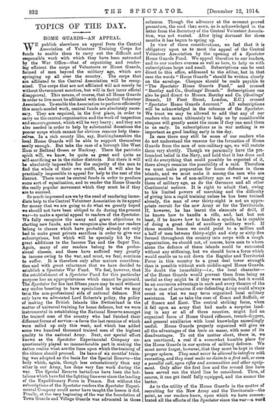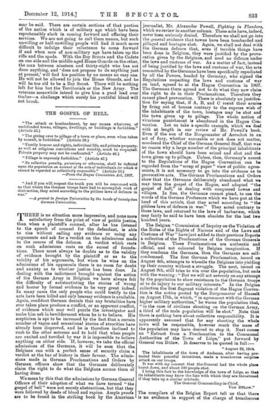TOPICS OF THE DAY.
HOME GUARDS—AN APPEAL.
WE publish elsewhere an appeal from the Central Association of Volunteer Training Corps for funds to enable them to carry out the difficult and
responsible work with which they have been entrusted by the War Office—that of organizing and render- ing efficient the corps of Volunteers or Home Guards, formed of men beyond the military age, which are springing up all over the country. The corps that are affiliated to the Central Association will be recog- springing up all over the country. The corps that are affiliated to the Central Association will be recog-
nized. The corps that are not affiliated will not merely be without Government sanction, but will in fact incur official disapproval. This means, of course, that all Home Guards in order to live must be affiliated with the Central Volunteer Association. To enable the Association to perform efficiently this much-needed work, central funds are absolutely neces- sary. They are required, in the first place, in order to carry on the central organization and the work of inspection and encouragement, which will be very heavy ; and they are also needed in order to help by substantial donations the poorer corps which cannot for obvious reasons help them- selves. In a rich county like, say, Buckinghamshire the local Home Guards will be able to support themselves easily enough. But take the case of a borough like West Ham or Bethnal Green or Hackney. There the patriotic spirit will, we know, be quite as great and quite as self-sacrificing as in the richer districts. But there it will be absolutely impossible for the majority of the men to find the whole of their own outfit, and it will also be practically impossible to appeal for help to the rest of the district. There must be central funds in order to produce some sort of equalization, and to render the Home Guards the really popular movement which they must be if they are to succeed.
So much impressed are we by the need of rendering imme- diate help to the Central Volunteer Association in its appeal for money that we are going to do what we greatly hoped we should not have been obliged to do during the present war—to make a special appeal to readers of the Spectator. We fully recognize the many and grave objections to starting new funds, and we recognize also that our readers belong to classes which have probably already not only had to make great private sacrifices in order to give war subscriptions, but which will be specially hit by the great additions to the Income Tax and the Super Tax. Again, many of our readers belong to the profes- sional classes, and these have suffered very greatly in income owing to the war, and must, we fear, continue to suffer. It is therefore only after mature considera- tion and with great reluctance that we have decided to establish a Spectator War Fund. We feel, however, that the establishment of a Spectator Fund for this particular purpose has an appropriateness which cannot be gainsaid. The Spectator for the last fifteen years may be said without any undue boasting to have specialized in what we may term the non-professional side of national defence. Not only have we advocated Lord Roberts's policy, the policy of making the British Islands like Switzerland in the matter of universal training for home defence, but we were instrumental in establishing the National Reserve amongst the trained men of the country who had finished their different forms of service—a force the last remains of which were called up only this week, and which has added some two hundred thousand trained men of the highest quality to the national Army. Next, our special effort known as the Spectator Experimental Company un- questionably played no inconsiderable part in making the nation realize what are the lines upon which the training of the citizen should proceed. Its basis of six months' train- ing was adopted as the basis for the Special Reserve—the body which, again, though less ostentatiously than any other in our Army, has done very fine work during the war. The Special Reserve battalions have been the bat- talions which have fed the fighting line ever since the landing of the Expeditionary Force in France. But without the subscriptions of the Spectator readers the Spectator Experi- mental Company could never have taught the lesson it did. Finally, at the very beginning of the war the foundation of Town Guards and Village Guards was advocated in these
columns. Though the advocacy at the moment proved premature, the seed then sown, as is acknowledged in the letter from the Secretary of the Central Volunteer Associa- tion, was not wasted. After lying dormant for three months it has begun to spring up.
In view of these considerations, we feel that it is obligatory upon us to meet the appeal of the Central Volunteer Association by the opening of a Spectator Home Guards Fund. We appeal therefore to our readers, and to our readers oversea as well as here, to help us with subscriptions large and small. Subscriptions can be sent direct to this office, addressed to the editor, but in that case the words " Home Guards " should be written clearly on the envelope. Cheques should be made payable to "The Spectator Home Guards Fund," and crossed " Barclay and Co., Goslings' Branch." Subscriptions can also be paid direct to Messrs. Barclay and Co. (Goslings' Branch, 19 Fleet Street, London, E.C.) crossed " Spectator Home Guards Account." All subscriptions will be acknowledged in the columns of the Spectator. We trust we may be allowed to add that any of our readers who mean ultimately to help us by considerable cheques will greatly assist the cause if they can send them to us early. In subscriptions as in war nothing is so important as good leading early in the day.
In case there may still be some of our readers who do not understand the reasons for the formation of Home Guards from the men of non-military age, we will restate them very shortly. Though we personally have the pro- foundest belief in the Navy, and hold that it has done and will do everything that could possibly be expected of it, there always remains the possibility of a raid. Therefore we must make preparation for home defence in these islands, and we must make it among the men who are pronounced to be of non-military age as well as among those of military age, as do the Germans and all other Continental nations. It is right to admit that, owing to his limited powers of marching and the difficulty of giving him a rapid training unless he has been trained already, the man of over thirty-eight is not an appro- priate recruit for the new Army or for the Territorials. If, however, he has learnt the elements of drill, if he knows how to handle a rifle, and, last but not least, if he knows how to handle a spade, he is capable of doing a great deal of auxiliary military work. If three months hence we could point to a million and a half of men between thirty-eight and sixty or sixty-five formed throughout the country into corps with a rough organization, we should not, of course, have men to -whore alone the defence of these islands could be entrusted without any stiffening, but we should have a force which would enable us to cut down the Regular and Territorial Force in this country to a great deal lower strength than is possible without such middle-aged Home Guards. No doubt the immobility—i.e., the local character— of the Home Guards would prevent them from being as useful as they might be if they were mobile, but it would be an enormous advantage in each and every theatre of the war in case of invasion if our defending Army could always count on what we may term organized local military assistance. Let us take the case of Essex and Suffolk, or of Sussex and Kent. The central striking force, when it fell upon an army that had made a surprise land- ing in any or all of these counties, might find an organized force of Home Guard riflemen, trench-diggers, and general auxiliaries with local knowledge exceedingly useful. Home Guards properly organized will give us all the advantages of the levee en masse, with none of its disadvantages. To cut the matter short, there is, we are convinced, a real if a somewhat humble place for the Home Guards in our system of military defence. We must never forget, however, that they must be kept in their proper sphere. They must never be allowed to interfere with recruiting, and they must make no claim to a first call, or even a parallel call, upon rifles and ammunition and other equip- ment. Only after the first line and the second line have been served can the third line be considered. Then, of course, it can get itself fully equipped, and the sooner the better.
As to the utility of the Home Guards in the matter of recruiting for the New Army and the Territorials—the point, as our readers know, upon which we have concen- trated. all the efforts of the Spectator since the war—a wort may be said. There are certain sections of that portion of the nation which is of military age which have been reprehensibly slack in coming forward and offering their services. We are not going to call them names, but such unwilling or half-unwilling people will find it much more difficult to indulge their reluctance to come forward if and when men of non-military age have taken up the rifle and the spade. With the Boy Scouts and the Cadets on one side and the middle-aged Home Guards on the other, the man between nineteen and thirty-eight who has not done anything, and • does not propose to do anything just at present,' will find his position by no means an easy one. He will not be allowed to join the Home Guards, and he will be too old to be a, Boy Scout. There will be nothing left for him but the Territorials or the New Army. The veterans meanwhile intend to give him a good lead over timber—a challenge which surely his youthful blood will not brook.















































 Previous page
Previous page